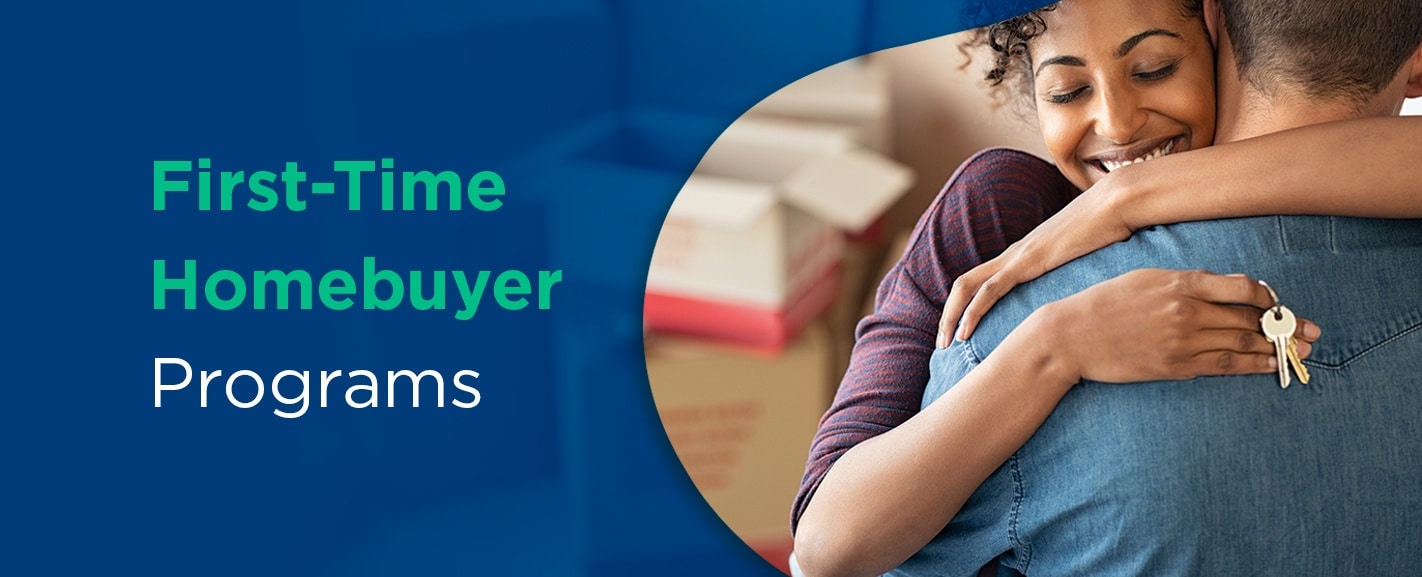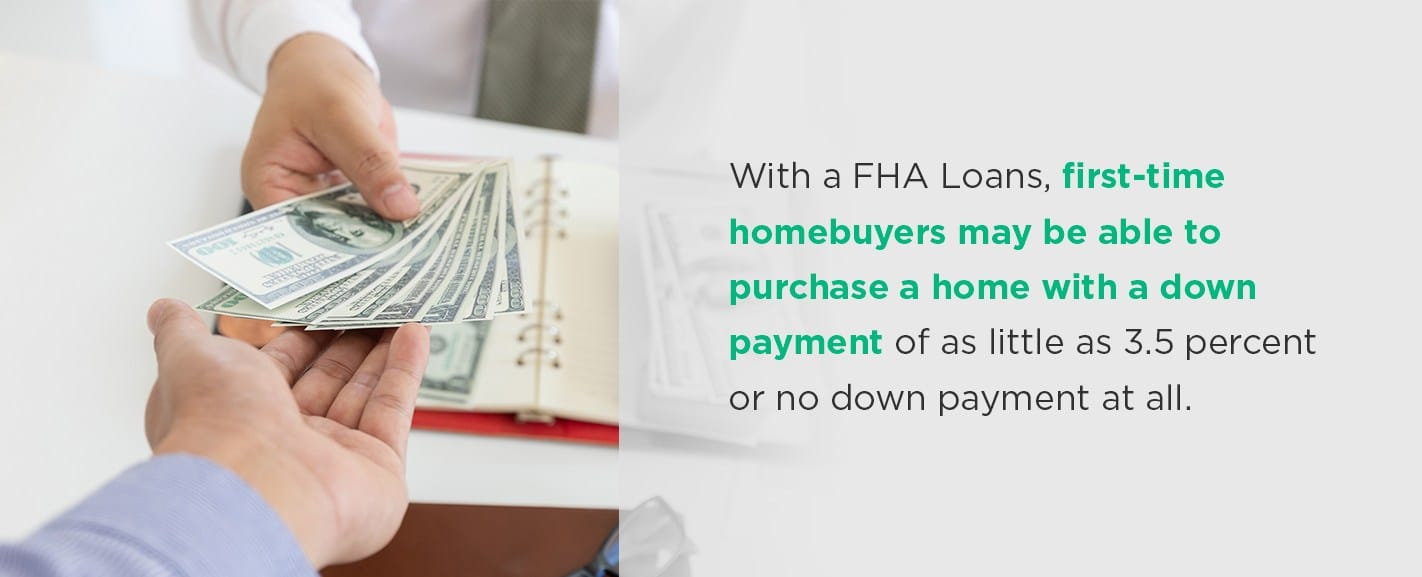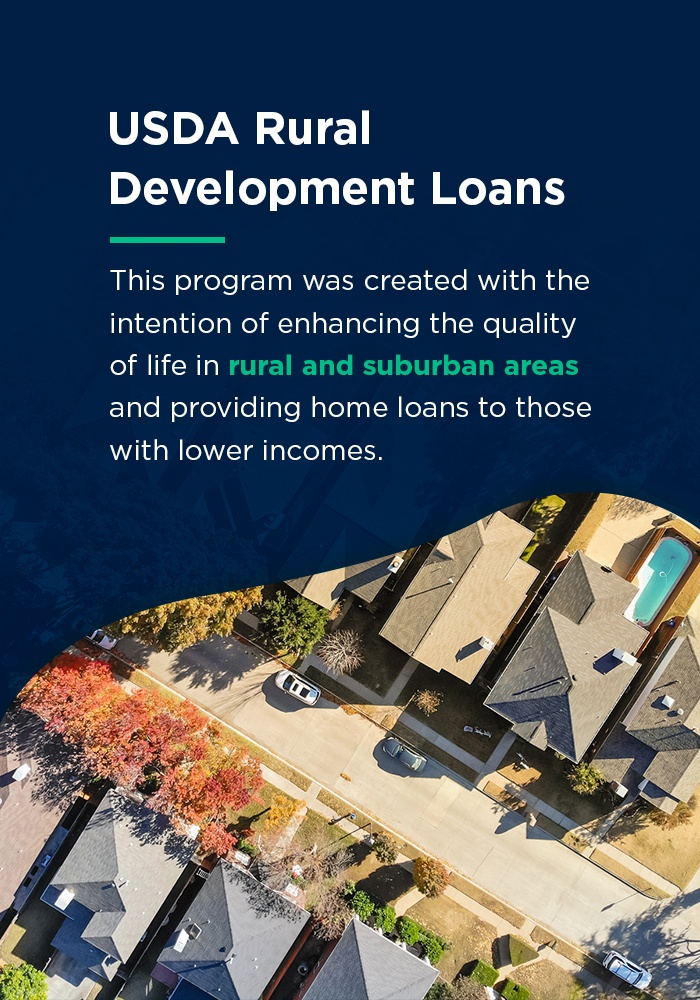Month: January 2020

Purchasing a home can be overwhelming for first-time homebuyers. The average age of a first-time homebuyer has continued to rise, especially as homebuyers are burdened with large amounts of student loan debt that make saving up for a home difficult.
Though the real estate market can seem complicated to anyone looking to purchase their first house, there are programs that can be particularly helpful to first-time homebuyers. First-time homebuyer programs include loans like FHA loans, VA loans and USDA Rural Development loans. Be sure to consider all your options when making your decision about how to finance your home.
Overview of First-Time Homebuyer Loans and Programs
There are several government home loans designed specifically for first-time homebuyers. Some of the most common first-time homebuyer government programs include:
1. FHA Loans
FHA loans are a great loan option for first-time homebuyers looking to finance a home at a lower interest rate and with a small down payment.
FHA refers to the Federal Housing Administration, an agency of the U.S. Department of Housing and Urban Development. FHA loans are insured and distributed by the FHA, and these loans protect your mortgage lender in the event you default on your mortgage.
FHA loans can be secured with lower down payments, and they offer competitive interest rates and closing costs when compared to conventional loans. With a credit score of 580 or higher, you may be able to put down as little as 3.5 percent of your home’s purchase price.
2. VA Loans
VA loans are an attractive loan option for military members. These loans are backed by the U.S. Department of Veterans Affairs, and those who are eligible include active-duty military members, surviving spouses and veterans. A portion of this loan is guaranteed by the VA, and they offer competitive interest rates. They also don’t require a down payment, which makes this loan an excellent option for military members who don’t have much savings.
Homebuyers don’t have to pay private mortgage insurance with a VA loan. There’s also no minimum credit score required to be eligible, and if you struggle to make your payments on the mortgage, the VA can negotiate with your lender for you.
3. USDA Loans
USDA loans are an excellent loan option for first-time homebuyers who are looking to finance a rural property with little to no down payment.
The USDA — U.S. Department of Agriculture — offers a homebuyer assistance program for homes purchased in certain rural areas. The USDA guarantees the loan, and first-time homebuyers can sometimes obtain a loan without any down payment.
The credit score requirements are a bit higher for a USDA loan than for an FHA loan. With a credit score of 640 or above, homebuyers can qualify for a loan after a simple application process. If you have a score below 640, you may still be able to qualify, but you will likely have to present additional documentation.
This program also has income limitations that vary by region, so if your income exceeds the limit, you may not be able to qualify for a USDA loan.
4. Fannie Mae and Freddie Mac
Fannie Mae and Freddie Mac are two government entities that work with lenders to provide mortgage options for low to moderate-income families. Loans backed by Fannie Mae or Freddie Mac can offer homebuyers competitive interest rates. Homebuyers may also be able to qualify for a loan with a down payment as low as three percent of the home’s purchase price.
FHA Loans
If you’re looking to purchase your first home but unsure if you qualify for a conventional loan, an FHA loan may be the right financing option for you. If you’ve dealt with financial challenges in the past, this loan option offers low barriers for qualification than other conventional loans.
What Are FHA Loans?
Lenders are protected by the Federal Housing Administration when they lend FHA loans to homeowners. Because these loans are backed by the FHA, you don’t need a perfect credit score or a large down payment to qualify. In fact, first-time homebuyers may be able to purchase a home with a down payment of as little as 3.5 percent or no down payment at all. If you struggle with your payments, you also have the option of refinancing an FHA loan.
Should You Apply for an FHA Loan?
Do you have less-than-excellent credit? Have you filed for bankruptcy before? Are you still working on improving your finances? If these apply to you, you may not qualify for a conventional loan, but you may still qualify for an FHA loan.
First-time homebuyers don’t usually have perfect credit or don’t have enough saved to put 20 percent down on their dream home. Younger people often haven’t been building their credit very long or been in the workforce long enough to save up a significant amount of money. This is why an FHA loan can be such a great option for first-time homebuyers.
Consider applying for an FHA loan if:
- You have a credit score of at least 500: With a credit score of 500-579, you may be able to qualify for an FHA loan as long as you have a down payment of 10 percent. With a credit score of 580 or above, you may be able to qualify with a down payment of just 3.5 percent.
- You have a steady employment history: Since you don’t need a perfect credit score for an FHA loan, lenders look more closely at employment. To qualify for an FHA loan, you may need to show a steady employment history or that you have been with your employer for a minimum of two years.
- You have a debt-to-income ratio of no more than 31 percent: The debt-to-income ratio for your home should tell lenders you’re likely to pay your mortgage every month. Additionally, your personal debt-to-income ratio shouldn’t be higher than 43 percent.
- You can pay mortgage insurance: With an FHA loan, borrowers must pay an Upfront Mortgage Insurance Premium, along with an Annual MIP. You can either pay your Upfront Mortgage Insurance Premium at closing or roll it into your mortgage. Your Annual MIP, on the other hand, is paid every month.
- Your home has been approved by an appraiser: To qualify for an FHA loan, your home has to meet certain requirements and must be appraised by an FHA-approved appraiser.
- Your home is your primary residence: You can’t acquire an FHA loan for investment properties. An FHA loan needs to be for your home.
RESOURCES
Downloadable Guides
We’ve created these guides to be a valuable resource to walk you step-by-step through your next adventure.
-
First-Time Homebuyer Guide
497.68 KiB
Thank you for your message. It has been sent! We will be with you in the next few minutes. Can’t wait? Call us! 1-844-825-1081
-
Refinance Guide
483.52 KiB
Thank you for your message. It has been sent! We will be with you in the next few minutes. Can’t wait? Call us! 1-844-825-1081
-
Reverse Mortgage Loan Guide
525.09 KiB
Thank you for your message. It has been sent! We will be with you in the next few minutes. Can’t wait? Call us! 1-844-825-1081
VA Loans
If you’re an active service member, a military veteran or a surviving spouse, you may be able to obtain a VA loan. These loans are guaranteed by the U.S. Department of Veterans Affairs, so you won’t have to pay mortgage insurance, and you may not need a down payment.
What Are VA Loans?
The U.S. Department of Veteran Affairs administers loans for service members. This loan is meant to give financing options to military spouses and veterans who want to purchase a new home.
There are no minimum income requirements to qualify for a VA loan, though you’ll need to earn enough to cover your loan and other monthly fees. This lack of an income requirement can make this loan option appealing for veterans who may be earning a low income.
The VA also doesn’t place a cap on how much you can borrow, but they do set limits on the amount of liability they’ll assume. This limit will vary based on your location. As of 2020, the limit for most VA loans is $510,400. For high-cost areas, the limit is $765,600.
If you struggle with making your mortgage payments, the VA also may be able to help you. The VA may negotiate with the lender on your behalf and help you refinance or figure out your repayment plan so you can avoid foreclosure. The Interest Rate Reduction Refinance Loan program, known as IRRRL, can allow you to reduce your interest rates.
Should You Apply for a VA Loan?
VA loans can be particularly appealing to first-time homebuyers because you can get a home without a down payment, and you won’t have to pay private mortgage insurance, which homebuyers often have to pay if they put less than 20 percent down with a conventional loan.
If you meet one of these basic qualifications, you may apply for a VA loan:
- You served on active military duty for at least 90 days during wartime.
- You served on active military duty for at least 181 days during peacetime.
- You served as a National Guard or Reserves member for at least six years.
- You were married to someone who died while serving or who died after sustaining injuries while serving.
Consider applying for a VA loan if:
- You have a credit score of at least 620: If you have a credit score of 620 or higher, you’re more likely to qualify for a VA loan. With a credit score below 620, you’ll likely be given a higher interest rate.
- Your home is your primary residence: You can’t use a VA loan to purchase a second property or vacation home. You can also use a VA loan for cash-out financing, adapted housing grants and for the Interest Rate Reduction Refinance program.
- You earn enough to pay your monthly fees: Though there may not be an income requirement to qualify for a VA loan, you’ll be expected by your lender to earn enough that you can pay back your loan.
- You can move in within two months: After you purchase the home, you may be required to move in within two months, as the VA wants borrowers to use their homes for their primary residence. One exception is if a VA loan holder is deployed immediately after the purchase of the home.
USDA Rural Development Loans
Another great first-time homebuyer program option is a USDA Rural Development loan. If you’re looking to finance a rural property, then you may want to consider a USDA loan.
What Are USDA Rural Development Loans?
USDA loans are offered by the U.S. Department of Agriculture to borrowers who live or want to live in an eligible rural or suburban location. Borrowers can secure USDA loans with lower interest rates, even without a down payment.
This program was created with the intention of enhancing the quality of life in rural and suburban areas and providing home loans to those with lower incomes. In fact, having a high income may make you ineligible for a USDA loan.
As such, a USDA loan can be an excellent option for a first-time homebuyer who may have a lower income and little savings to put toward a down payment.
Should You Apply for a USDA Rural Development Loan?
Consider applying for a USDA Rural Development loan if:
- Your home is located in an eligible area: To qualify for a USDA loan, your property must be located in an eligible rural or suburban area.
- Your home is your primary residence: USDA loans must be used to purchase a primary residence, not a second property or vacation home.
- You are a lower-income earner: Your income should be relatively low for your region. You can use the USDA’s income eligibility calculator to determine whether you qualify.
- You have a credit score of at least 620: When applying for any mortgage, the higher the credit score, the better. Though lenders may be more lenient about credit scores for borrowers of USDA loans, your loan terms will be better with a good credit score.
- Your debt-to-income ratio is below 41 percent: Lenders want to see a reasonable debt-to-income ratio from their borrowers, so they know the borrowers will pay back their loan. If your credit score is higher than 680, you may still be able to qualify with a higher debt-to-income ratio.
Find the Right Loan for You at Assurance Financial
Buying a first home is an important milestone for many people. At Assurance Financial, we can help you reach that milestone and prepare you for what comes after.
Let us help you secure the right loan for your dream home. Ready to find the right loan for you? Apply in as little as 15 minutes online with Abby.
You’ve just found the home of your dreams! Now you need to sell your current home. Regardless of whether you’re selling in a buyer’s market or a seller’s market, the tips and tricks for selling your home fast are the same. In either market, you’ll find that buyers are most interested in your property during the first few weeks after you put it on the market, so you’ll want your home to be in prime condition from day one to sell quickly.
To help you through the process, we’ve compiled all the tips for selling your home that you need to make a quick sale and move into your dream home.
Find the Right Real Estate Agent
If anyone knows how to sell a house fast in your area, it’s a local real estate agent.
Finding the right real estate agent is one of the key methods for selling your home fast. You can probably find a real estate agent quickly, but how do you find the right agent? For many homeowners looking to sell, the prospect of finding the right real estate agent to guide them through the process can be overwhelming.
To help you find the right real estate agent, follow these tips.
1. Get Referrals
Talk to your family, friends and acquaintances to see if they know any real estate agents they would recommend. What was their experience with a particular real estate agent? Would they want to work with that real estate agent again? Focus on talking with people who were in a similar situation as you when they were selling their home. You’ll want to work with a real estate agent who is experienced in working with clients like you. For example, are you looking to downsize? Are you interested in luxury properties? You want a real estate agent who is comfortable working with your situation and needs.
To make sure the real estate agent is reputable, you also may want one who is a member of the National Association of Realtors (NAR). As a member of this organization, the agent has agreed to abide by a code of ethics. You may also want an agent with certifications, such as a Certified Residential Specialist. A real estate agent with this designation has trained to handle residential properties.
2. Research Your Candidates
After you’ve collected a list of referrals, you can begin researching your candidates. Do they have a website or social media presence? Are there any online reviews? A couple of negative reviews is normal, but several negative reviews may be a red flag that you may not want to work with this agent.
You can also look up a candidate on the local Better Business Bureau website or the state’s real estate regulator. You’ll find out whether a candidate is licensed or has received complaints.
3. Interview Agents
How many real estate agents you interview is up to you, but interviewing three candidates should give you a good idea of what you’re looking for and what qualities you may not want in an agent. During an interview, you’ll get a sense of the agent’s approach, experience, availability and preferred method of communication. Do you prefer communicating via text or phone calls? What are the most convenient times in your schedule to work with the agent or show your home? The right agent for you knows your area and can work with your schedule.
4. Ask Agents for References
For the agents you’re interested in working with, ask them to give you contact information for a few of their most recent clients and information on the homes they’ve sold in the last year. You can then contact the agent’s clients to ask about their experience with the agent. Did they have a positive experience? Would they hire that agent again?
5. Examine Your Contract
Once you’re ready to move forward with an agent, examine your contract to review the terms, particularly the commission your real estate agent will be receiving. Sellers generally pay 5 or 6% in commission, with half going to the seller’s agent and half to the buyer’s agent. You should also note the term of the contract, and aim for a term of six months or less.
As with any relationship, trust your gut when it comes to selecting a real estate agent. Beyond numbers and qualifications, you want a real estate agent you can get along with and have a great working relationship.
Choose the Right Time to Sell
How do you sell a home fast? One of the first steps is knowing whether you’re selling at the right time. Your real estate agent can’t make every decision about your home selling process, and choosing the right time to sell should be a decision you can make on your own.
The month and possibly even the day you choose to list your home can play a huge role in how long it takes you to sell. So how do you pick the best time to sell your house fast?
Here are a few tips to follow for choosing the right time to sell:
1. Sell in the Spring or Summer
Spring and summer tend to be the best seasons of the year to sell a home. Spring and summer tend to offer weather conditions that are optimal for home shopping, and when buyers still haven’t found a home by the summer months, they start to become worried. For many families, finding a home before the start of the new school year motivates them to find a property quickly. Sellers can reap the benefits of this urgency from buyers by selling faster and for a higher price.
Selling during the off-season doesn’t always mean a loss, though. In places that tend to be warm year-round, you may be able to sell when snowbirds travel to your state for the winter. During the fall and winter in colder areas, you may be able to stage your home according to the season and holidays to make your property more appealing to potential buyers. You’ll also likely enjoy less competition in the fall and winter, meaning your home will stand out to buyers.
2. List Your Home on Thursday or Friday
Bright and early Thursday or Friday morning may be the best time to list your home. Most buyers will wait until the weekend to go house hunting, so they’ll start browsing their options on Thursday and Friday before the weekend.
Listing your home before Thursday means your property will be farther down on the listings page or on a different page entirely. You want your home to be one of the first that potential buyers see, and waiting to list until later in the week can help you accomplish this. In some areas with particularly competitive markets, you may even want to wait until Saturday to list your home.
3. Sell When It’s Right for You
Sometimes, our life circumstances dictate when we move. Maybe you found your dream home in October and you want to close and move in as soon as possible. You might be starting an out-of-state job in the dead of winter. You could wait to sell your home until spring, but would the financial costs of paying for two homes outweigh the benefits of waiting to sell until then?
Your financial situation and your priorities are sometimes the most important factors when choosing the right time to sell your home.
Another tip for how to sell your house fast is making sure your home is in top shape before you list it. Follow these tips to get you there.
1. Deep Clean
Time to put those cleaning skills to use. Before putting your home on the market, you may want to do a deep clean in every room. Sweeping the floors and dusting off the shelves is just the start. Don’t forget to vacuum and shampoo the carpet, scrub the bathroom tiles and wipe down the baseboards, kitchen cabinets, window blinds and ceiling fans. You may also want to give your windows a thorough cleaning to allow as much light as possible to shine in.
If you’d rather not do the deep cleaning yourself or you want to get it done fast, you can hire professionals to take care of the job for you.
2. Declutter
Many homeowners accumulate belongings over the years. When you’re ready to sell and move, you may find that you don’t use or want some of your belongings anymore. That couch you inherited from a relative that doesn’t match any of your other furniture, the second microwave you somehow acquired and the trinkets well-meaning friends and family gifted you over the years that serve no purpose — now is the perfect opportunity to get rid of all the items you no longer want.
Buyers want to see organization and open spaces. With plenty of clear space, potential buyers can get a better idea of the square footage of your property.
- Organize closets: This is an especially important task when decluttering, as buyers want to know that a home has plenty of storage space.
- Remove personal items: You may also want to remove family photos and other personal items so that buyers can imagine themselves in your home.
If you want to hold on to many of your belongings rather than sell or donate them, you can rent a storage unit to keep your items until you’re ready to move them to your new home.
3. Rearrange Furniture
You want your home to be inviting to potential buyers. Your furniture should make them want to sit down and relax. If your guests are bumping into things while they’re walking through your house, you may want to consider rearranging your furniture. You can move furniture away from your walls to give the feel of open space. Any big furniture that tends to get in the way, you may want to put into storage.
If you want to go the extra mile, you can hire a professional who can approach your home with a fresh pair of eyes and make suggestions on how you can rearrange the rooms.
4. Complete All Repairs
If your home requires repairs, especially extensive repairs, buyers can use them as leverage to offer a lower price. The more repairs you can make before listing, the more likely you’ll be to sell at or above your asking price. In a home that needs a lot of work and if you’re strapped for time, focus on the most significant issues.
Some issues are obvious and will catch the eye of just about any potential buyer, such as:
- Stains
- Peeling paint
- Rotting wood
- Loose tiles
- Dripping faucets
- Cracked windows
- Broken lights
- Loose door handles
Even if a buyer doesn’t pick up on an issue, an inspector will.
If you’re unsure whether fixes need to be made, you can schedule an inspection before listing the property. If your goal is to sell your home fast, you don’t want risk losing the sale over something that can be fixed before buyers even lay eyes on it.
5. Stage Your Home
The finishing touch on the interior of your home is staging. Through staging, you can make your rooms appear bigger and more spacious and decorate in a way that makes buyers feel like they could make this house their home. Setting the table with your good china and linens can give buyers the ability to envision themselves living in your home, for example.
If you need inspiration, you can search online or even hire a professional stager.
6. Add Curb Appeal
Even if you’re satisfied that you’ve cleaned, decluttered, fixed and staged the interior of your home to perfection, you may still want to do a little work on the exterior. Before showing your home, you’ll probably want to do a little landscaping.
- Mow the lawn
- Trim the hedges
- Rake leaves
- Clear walkways
- Plant flowers
- Sweep the porch
- Cut down overgrown tree branches
When your home is in pristine condition, it’s far more likely to sell fast.
List and Promote Your Home
Once you’ve prepared your home for selling, you can get ready to list and promote your home.
1. Price Your Home Accurately
Allowing your ego to inflate your home price may prevent you from being able to sell your property. You might find comparable sales by looking at online databases, local newspapers and local assessors’ offices. A real estate agent may also be able to help you list your home at the appropriate price according to its square footage. In a buyer’s market, you may want to select a price that will interest buyers in your home. Pricing low may even result in a bidding war that pushes your home price up to the range you wanted.
2. Be Upfront About Flaws
No matter how much work you put in before selling, your home will most likely have some flaws. If you’re upfront about these flaws with potential buyers, you’ll ensure that you’re not wasting their time or yours. While the description on your listing should make your home sound appealing, it should also be accurate. Neither your description nor photos should be deceptive. Not much is more disappointing for a buyer than discovering the dream home they found online looks completely different in person.
3. Provide a Good Experience
Your goal should be to make your home a must-buy for potential buyers. Generally, you have only one chance to make a good impression on a buyer. By the time you’re ready to show your home, it’ll be clean, decluttered and staged to enhance its appeal to buyers.
Put on some music, light a fire in the fireplace, bake cookies or light candles. Your house should smell, sound and look appealing, like a place potential buyers can call home.
Get a Mortgage in 15 Minutes – Let Assurance Financial Help You Buy Your Dream Home
If you’ve found your dream home, Assurance Financial can help find the right mortgage for you. We offer personalized service to guide you to the best option, whether you’re downsizing, dream-sizing or buying a second home. To see if you qualify, apply with Abby online in only 15 minutes!







